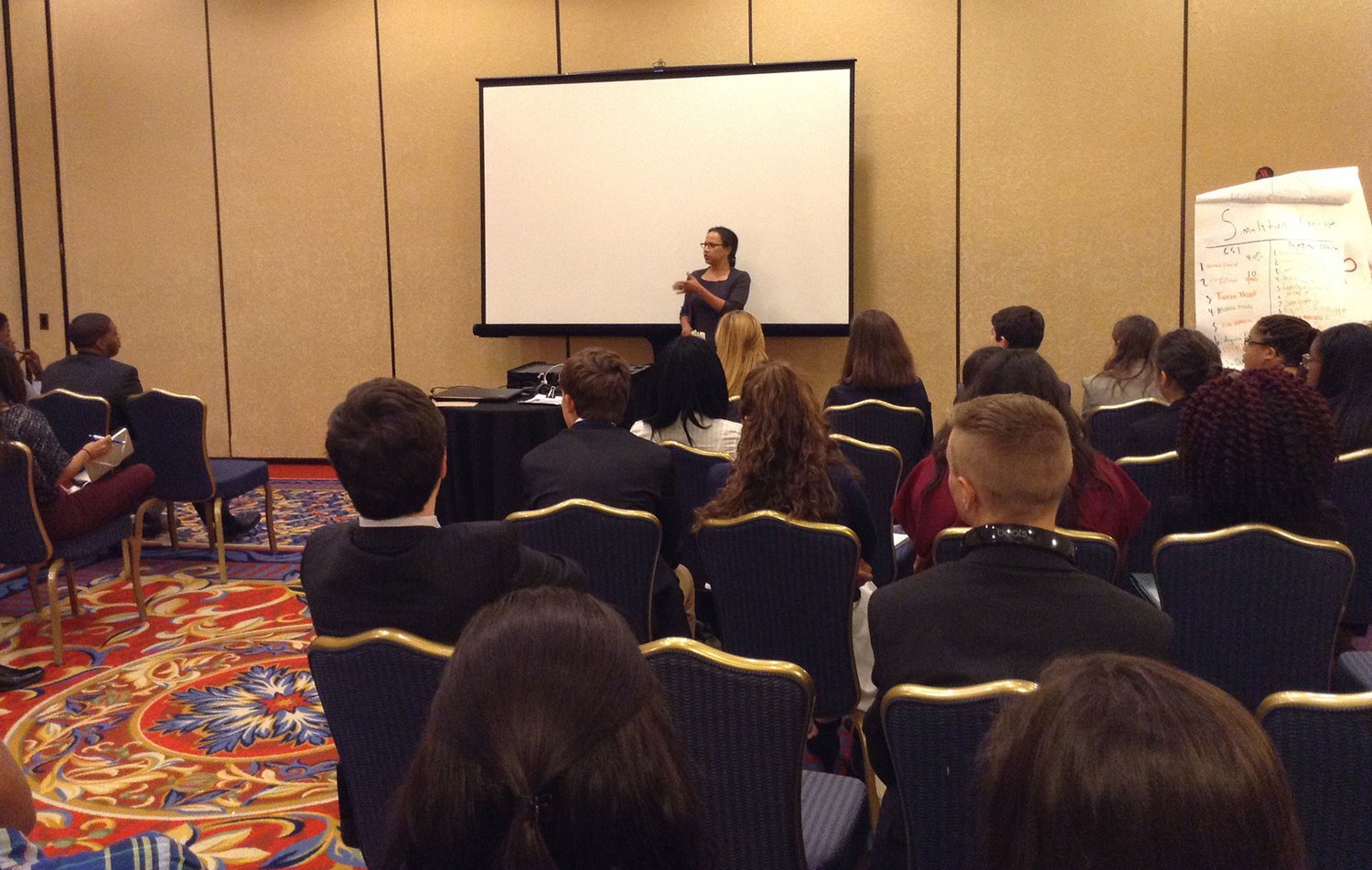
Need help standing out in a crowded job market?
“There’s been a vast improvement in my job search prospects since I talked to you. It was incredible how quick it all happened. Not only am I finally getting responses to my résumé, but I also just wake up feeling better, with more get-up-and-go. Things are starting to move!”
Shauna C. Bryce as a legal careers panelist for “Carpe JDiem: Leveraging Legal Skills in Alternative Careers” at University of Pennsylvania School of Law. Moderated by Vivia Chen, senior columnist at The American Lawyer and the creator of The Careerist blog, with Djung Tran of Tran Law Associations; Scott Lee of the U.S. Commodity Futures Trading Commission; and David Zhou of the SDNY U.S. Attorney's Office.
If you’re a junior lawyer, a new attorney, a traditional law school student (straight from college to law school), or a non-traditional law student (second-career, multiple degrees, more than two years of non-attorney work history, etc.), then right now you’re facing questions and decision-making on:
Finding your place in the legal field, including the types of job environments that suit you and your goals best
Deciding how to use your law degree, both for a job now and to set up you for the career and life you want
Converting the $$$$$ you invested in your law degree into a legal or law-related job that’s full-time, permanent, paying (preferably, market rate!), and setting you up for continued success as you advance in your career
Showcasing your individuality and your value—in your résumé and LinkedIn profile, as well as in job interviews
Navigating the legal job market in a highly competitive economic environment
Finding and seizing opportunities—not just for a job now, but also to build your legal career
Understanding, meeting, and even exceeding hiring attorneys’ expectations throughout the hiring process
And a whole lot more.
How we can help you
Career Challenges for Early Careers
“I joined [AmLaw 100 law firm] right after we did my résumé the first time. A BigLaw partner on the other side of the deal asked for my résumé and that day he sent it to 5 AmLaw 100 firms. I interviewed with 4 and got offers from 2. Even though I had never practiced before and didn’t work in a law firm, the firm lateraled me in as a second year.”
The exact numbers wax and wane, but each year there are some 125,000 students enrolled in law school, and tens of thousands joining the ranks of newly licensed attorneys.
Your JD or LLM is the starting point of your legal career, not the end goal. Now you have to decide how to use that degree. What kind of career do you want? Where do you want to be in 5 years, 10 years, or 30 years from now? What if you don’t know? How do you set yourself up for success?
What if you don’t even know which practice areas will be the best fit for you? Or types of legal environments, like how big law firms, small law firms, government, nonprofits, and other employers differ? How do you get started off on the right foot—particularly if you’re feeling like you’ve already made some career missteps or that your law school career services hasn’t been able to help you the way you’d hoped?
You’ll also need more than a law degree to wow hiring attorneys with your potential to be a good practicing lawyer.
But many law students don’t know how to write a résumé that impresses employers. They don’t teach that in law school.
“I got caught up in what I was supposed to be doing, as opposed to what I wanted to be doing. This session has helped me realize how much that has happened... It’s a real weight off my shoulders... [N]ow I can see myself down the line in a career that I would be interested in.”
Worse, résumé samples from law school career services centers often don’t help you stand out. Instead, they make everyone look the same. And if you were all the same, then that format would serve you equally well.
But what do you do if…
“When I talked to Career Services, they basically told me there was nothing I could do to look for a job while I wait for the bar exam results. But you’ve already outlined a lot of logical things I could be doing to be a better candidate and look for a job. And that makes so much more sense to me, because doing nothing but sitting around makes *no* sense.”
You’re more than an inflexible and dated résumé template?
Your GPA doesn’t reflect your abilities or you’re a hands-on learner?
Your current résumé focuses on your college jobs in retail or restaurants rather than your potential as a lawyer?
You have questions about getting your legal career off to a good start?
Your law school career services center is overwhelmed can’t offer you the individual help you need?
You’re still waiting to pass the bar exam and be sworn into your state’s bar, a process that can take months—or even years?
You want to do something different, rather than follow a traditional path?
You don’t even know what you want to do with your career or where to start next?
Every junior associate or entry-level attorney is different, with different backgrounds, strengths, weaknesses, and career goals. You’re applying in different areas of the country, to different types of employers who look for different qualifications…
An aspiring litigator is great with people and great on his feet.
He took two clinics and summered at litigation boutiques where he excelled. But he’s not so great in the classroom. His grades just don’t reflect his ability. How can he find and market himself to employers who value his strengths rather than focus on his weakness?
An entry-level lawyer with an M.S. and a B.S. in mechanical engineering co-authored six academic papers.
She’s now a patent agent in the U.S. Patent and Trademark Office (USPTO), a non-attorney role. Now that she has two years of solid training in patent prosecution, how can she transition to a patent attorney role that pays more and sets her up for a long legal career?
A second-career law school student worked in his family’s construction company for six years and then as a real estate broker for another 10 years.
He isn’t a traditional law student and, while he understands the idea of paying one’s dues, he doesn’t want a traditional entry-level lawyer experience. How can he get proper credit at a law firm for his valuable work experience and transferrable skills?
A law student wants to switch direction from immigration to high finance.
Anticipating she would be an immigration lawyer, she attended her local Tier 3 law school because of its strong ties to the local immigrant community. However, she worked full-time during law school at a local bank, and now she’s decided to pursue a career in Islamic finance. Is it possible to land a role in a multinational financial services institution or a Big 4 consulting firm?
A junior associate on a budget wants coaching and résumé writing help.
He finds hiring a professional to be a financial commitment he hesitates to make on top of his student loan obligations. Yet, he needs more individualized assistance than any generic résumé book or his law school career service center can provide. How can he get personalized résumé help on a budget?
A newly admitted attorney is first generation American.
She’s also the first college graduate—and first lawyer—in her family so she can’t inherit a professional network from her family. How can she start to build a network of her own?
*Samples are composites designed to protect the identities of individual clients.
Career Services for Early Careers
We offer writing and coaching services to address the needs of those new to the legal market. Just a few of the areas we can help you with are:
Writing and Interviewing
Résumés
Cover letters and correspondence
LinkedIn profiles
Letters of recommendation
Identification of value and potential
Interview prep for OCIs, callbacks, and other interviews
Deciding on what to do with your law degree
Discussing gap years, bad grades, and other issues
Immediate and Long-Term Career Decision-Making
Starting your career off right
Networking 101
Demonstrating interest in a practice area
Identifying your best fit roles and employers
Building career narratives around non-linear work experience
Getting sponsors and mentors
Leveraging early career or military experience
Getting credit for language and cultural fluencies
Changing job markets
Deciding among job offers
Performing well once you land a job
Career Coaching and Interview Prep for Early Careers
We make coaching for new lawyers and law students simple: just tell us the issues you’d like to discuss, and send us your current résumé so that we have some context. We can talk about interviewing, job search, networking—anything you need.
Shauna Bryce speaking at an Envision event in Virginia.
Résumé Writing for Early Careers
Get the help you want, when you want, at an affordable price.
We get that cost is a major factor if you’re at the start of your career—so we’ve pioneered a way to provide nationally recognized coaching and résumé writing help to entry-level lawyers needing help fast and affordably—while also needing more personalization and creativity than law school career service centers and résumé templates can provide.
Instead of hiring a true professional résumé writer to write your résumé from scratch or booking a multi-session package with a professional career coach—both long and expensive processes—we save you time and money through interactive, screen share services.
“I just accepted an offer at [AmLaw 100 law firm], as an Associate in their real estate section. Graduating from a Tier 4 school, I never thought this would be possible. I owe a huge part of it to you!”
Social Media and LinkedIn® Profile Optimization for Early Careers
“I’ve really been digging to LinkedIn and I’ve gotten more than 100 new connections in my area since we last talked. I’ve also been doing a lot of research to find lawyers who used to work at the employers I’m targeting.”
LinkedIn is a great place to be found. It is now one of top recruiting tools for retained, contingency, and internal recruiters. Therefore, we recommend all lawyers have a strong, polished presence on LinkedIn—even those who are not actively looking for a new job.
Get started early in your career—building a professional brand and presence, making connections into potential employers, researching, and establishing rapport with potential clients.
We can help you set up your profile and give you confidence and tips on reaching out effectively.
Why Work with Us? Sample Testimonials from Early Careers
Why work with Bryce Legal? How can you choose the best lawyer career coach and legal résumé writer for you? Here’s what just a few our clients say. For more, please see Our Client Testimonials.
Your Career Experts for Early Careers





